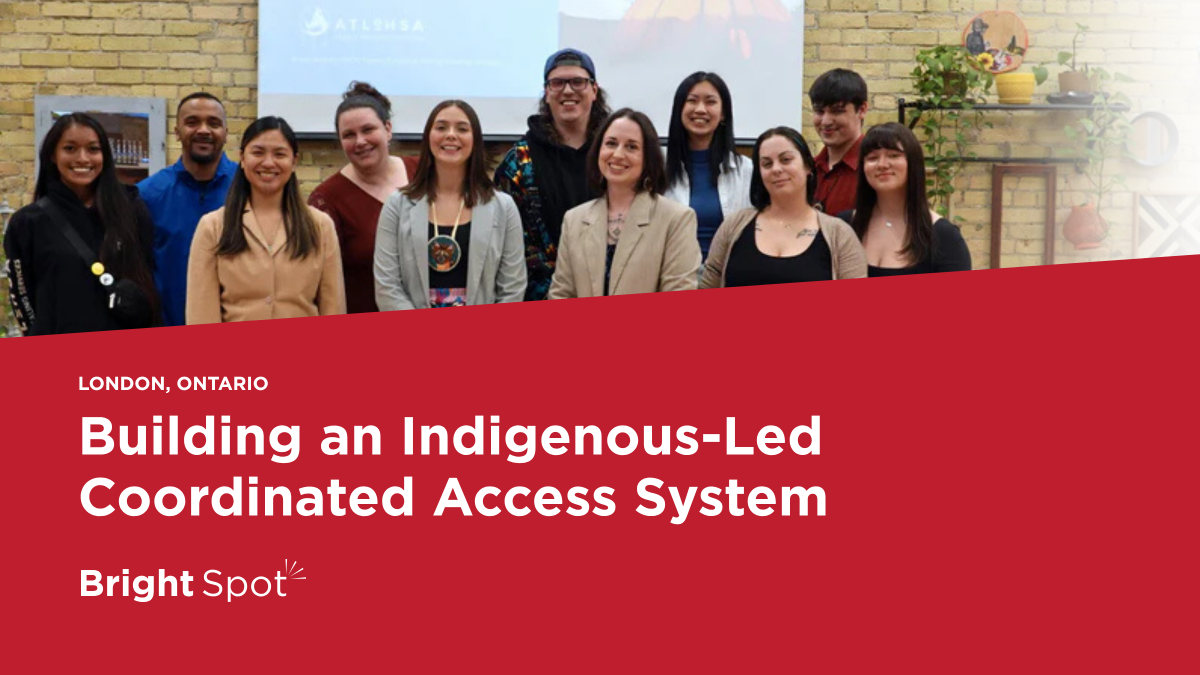 Building a future where homelessness is rare, brief and non-recurring requires that everyone experiencing or at risk of experiencing homelessness gets the right support at the right time. That’s where Coordinated Access comes in.
Building a future where homelessness is rare, brief and non-recurring requires that everyone experiencing or at risk of experiencing homelessness gets the right support at the right time. That’s where Coordinated Access comes in.
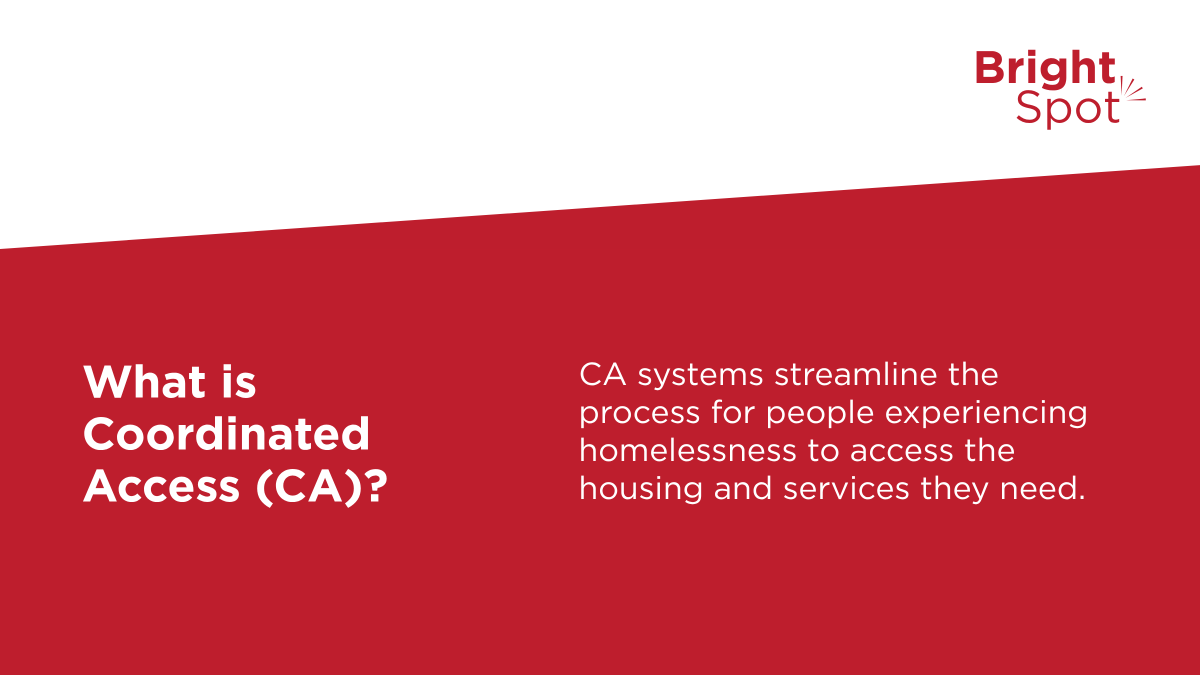 Coordinated Access systems streamline the process for people to access the housing and services they need. A lack of coordination isn’t just inefficient for communities and service providers – without it, individuals and families in crisis have to navigate a complex network of services, telling their story over and over and signing up for different wait lists. It can be a dehumanizing experience for anyone, and next to impossible for those with the most complex needs.
Coordinated Access systems streamline the process for people to access the housing and services they need. A lack of coordination isn’t just inefficient for communities and service providers – without it, individuals and families in crisis have to navigate a complex network of services, telling their story over and over and signing up for different wait lists. It can be a dehumanizing experience for anyone, and next to impossible for those with the most complex needs.
Unfortunately, while Coordinated Access has become central to Canada’s federal strategy to end chronic homelessness, this model has largely failed to respond to the specific needs, self-governance structures, and rights of Indigenous peoples. In London, Ontario, as in many other communities, Coordinated Access was implemented with little to no consultation with local First Nations or Indigenous organizations, leaving Indigenous peoples in the difficult position of needing to retroactively adapt and work within a system not designed with them in mind. This reality highlights the limitations of a one-size-fits-all approach, with each community having its own unique needs and differences.
Recognizing this, Atlohsa Family Healing Services led the Action Research to End Chronic Homelessness (ARCH) project in London to reimagine what Coordinated Access could look like if it were led by, for, and with Indigenous communities.
In London, Ontario, Indigenous peoples account for only 2.6% of the city’s population but nearly 30% of those experiencing homelessness. This overrepresentation stems from the ongoing impacts of settler colonialism and systemic barriers embedded in mainstream housing systems that fail to reflect treaty obligations and the needs of First Nations, Inuit, and Métis peoples.
Rooted in the Giwetashkad Indigenous Homelessness Strategic Plan, a model specific to the Southwestern Ontario region, ARCH provides highly localized recommendations in its report, Indigenous-Led Approaches to Coordinated Access in London, Ontario. While these may not be directly transferable to other communities, the process used to develop them offers valuable insights that others can adapt to their own contexts.
Building a Foundation
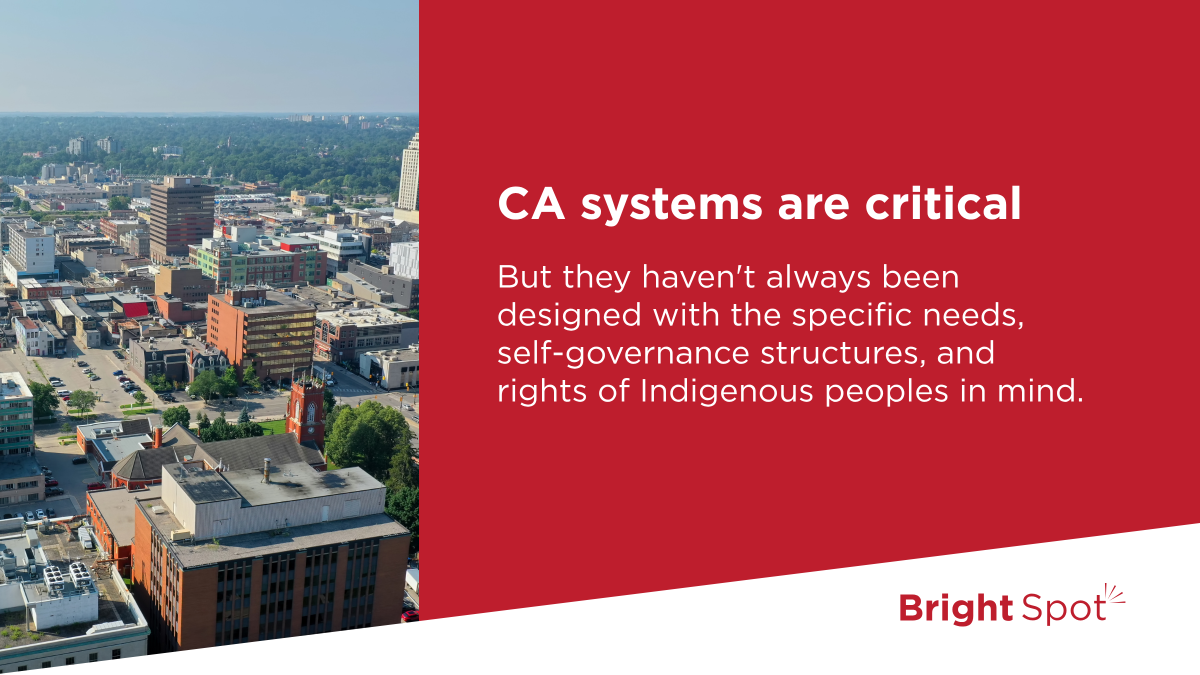 Since Reaching Home was implemented in 2019, several communities across Canada have pursued Indigenous-led approaches to Coordinated Access, including Hamilton and Winnipeg.
Since Reaching Home was implemented in 2019, several communities across Canada have pursued Indigenous-led approaches to Coordinated Access, including Hamilton and Winnipeg.
The Action Research to End Chronic Homelessness project (ARCH) program in London builds on this foundation. Atlohsa Family Healing Services, the City of London, and key federal partners such as Housing, Infrastructure and Communities Canada (HICC) came together with a shared understanding that Indigenous people are overrepresented in London’s homeless population and that mainstream services have not addressed their unique needs. Early conversations with Indigenous partners reinforced the necessity of Indigenous-led systemic change in the housing system.
Being led by Atlohsa, this project was foundationally guided by Indigenous research methodologies of Anishinaabe-Gikendaasowin (Ojibwe people’s <knowledge= or <intelligence=). From our perspective as Indigenous people, research is about mobilizing community knowledge based in our shared relationships.
Culturally grounded research methods, such as conversations and sharing circles, were used to engage with Indigenous and non-Indigenous service providers who support Indigenous people, Indigenous leaders, members of London’s urban Indigenous community, and Indigenous people with living experiences of homelessness to hear their feedback on London’s current Coordinated Access approach to homelessness services. Engagement sources included conversations with three Indigenous individuals with living experience of homelessness and four sharing circles with 27 Indigenous and non-Indigenous service providers who support Indigenous people. As well, mixed methods were also used, which included a literature review, statistical analysis of HIFIS data from 2022 to 2024, and an inventory of existing Indigenous housing and housing programs.
From Identifying Barriers to Strategic Action
As a result of Indigenous communities not being included from the beginning, our quantitative and qualitative analysis identified critical gaps in London’s Coordinated Access system that continue to create barriers to housing for Indigenous participants.
- Such barriers include: Indigenous individuals experience longer wait times for housing, spending a median of over 600 days on the By-Name List (a real-time list of all known people experiencing homelessness in a community).
- Indigenous youth (16–24), women, and gender-diverse people are overrepresented within the homeless population.
- Less than 12% of housing program spaces are Indigenous-specific, despite the population representing up to 30% of local homelessness.
- Deficit-based assessment tools (such as the VI-SPDAT triage tool) are not trauma-informed or culturally safe, not only for Indigenous peoples but everyone.
- Indigenous organizations are underfunded and structurally excluded from leading housing system coordination.
To effectively address systemic barriers within London’s Coordinated Access system, we proposed an Indigenous-led Coordinated Access approach, which refers to any community-based approach to addressing homelessness where Indigenous communities take the lead in designing and implementing a Coordinated Access system.
Building an Indigenized Approach Within a Western System
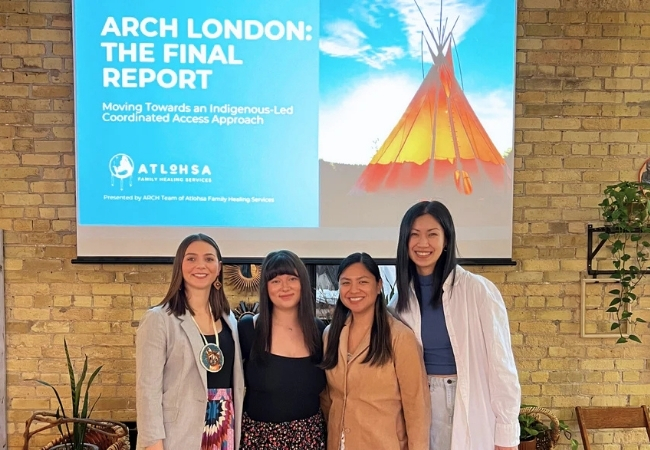 The ARCH project was not created to criticize Coordinated Access itself but to address how its current form fails Indigenous people. The ARCH report acknowledges the broader context: Indigenous homelessness is not just a housing issue, it is the result of historic and ongoing colonial displacement, intergenerational trauma, systemic racism, and jurisdictional exclusion. It cannot be addressed by systems that continue to marginalize Indigenous governance, knowledge, and communities.
The ARCH project was not created to criticize Coordinated Access itself but to address how its current form fails Indigenous people. The ARCH report acknowledges the broader context: Indigenous homelessness is not just a housing issue, it is the result of historic and ongoing colonial displacement, intergenerational trauma, systemic racism, and jurisdictional exclusion. It cannot be addressed by systems that continue to marginalize Indigenous governance, knowledge, and communities.
The Reaching Home Indigenous Community Entity (CE) stream is currently closed to new applicants, with no confirmed reopening timeline. Without access to direct CE funding, urban Indigenous communities like ours are forced to rely on municipal partnerships within systems not built to support them.
Recognizing this, Atlohsa sought to develop an Indigenized approach that could operate within the constraints of existing colonial housing infrastructure and available funding, while pushing it toward equity and accountability. Each recommendation is accompanied by clear action steps, identified resources, and supporting evidence, making it easy for all levels of government to see the potential of these solutions.
The development of an Indigenous-led Coordinated Access approach requires :
- Support across all levels of government for flexible, long-term funding
- Establishing and empowering Indigenous leadership to provide governance, co-design processes, and engage in strategic implementation
- Expansion of Indigenous-led street outreach teams and partnerships with Indigenous housing and homelessness service providers
- Creation of Indigenous-led Coordinated Access services teams
- Culturally relevant and low-barrier intake processes and paper readiness criteria (used to verify required documentation and proof of income to access housing)
- Data sovereignty and stewardship in accordance with the principles of ownership, control, access, and possession
- Indigenous-led case conferencing and matching
- Culturally relevant, Indigenous-led, affordable housing options across the housing spectrum
- Culturally relevant, Indigenous-led, wraparound wholistic housing services, including rent supplements, ID clinics, housing finders, street outreach, and high acuity housing programs
- Capacity building for culturally safe and trauma-informed services, including mandatory training for all participating programs
The Key Components of the ARCH London strategy and report reflect this as follows:
- Governance: Establish an Indigenous Homelessness Leadership Circle to co-govern Coordinated Access alongside municipal partners.
- Workforce: Fund and hire a dedicated Indigenous Coordinated Access team, including a manager, systems navigator, and liaison.
- Assessment Tools: Replace deficit-based tools with trauma-informed/culturally-safe, relational, and strengths-based approaches designed by Indigenous communities.
- Data Sovereignty: Apply OCAP principles (Ownership, Control, Access, Possession) to all Indigenous participant data within HIFIS.
- Housing Continuum: Expand Indigenous-led housing across shelter, transitional, supportive, and permanent housing.
- Funding: Allocate 30% of homelessness funding to Indigenous-led services, reflecting community needs and population data.
City of London’s Role
As part of this collaboration, the City provided Atlohsa with Homeless Individuals and Families Information System (HIFIS) data, quantifying the overrepresentation of Indigenous individuals experiencing homelessness and challenges they experience with longer wait times. The data also reaffirmed what Indigenous organizations have long recognized: that mainstream approaches alone are insufficient whereas culturally relevant, Indigenous-led solutions are essential.
Throughout the ARCH process, the City of London worked in partnership with Atlohsa, acknowledging the expertise of Indigenous organizations and supporting the creation of a more equitable homelessness response system. The ARCH project is not only a model of Indigenous leadership and community-driven research, but also a concrete step toward reconciliation in action.
The City of London’s role in the ARCH project has been a collaboration, including listening, learning, and supporting Indigenous leadership in developing solutions. The City recognizes the deep knowledge and consultation inherent in the Giwetashkad Indigenous Homelessness Strategic Plan and is committed to aligning efforts with this vision while working towards enacting the Truth and Reconciliation Calls to Action through concrete, measurable steps. As implementation moves forward, the City of London remains committed to supporting Indigenous-led pathways and working collaboratively to build a system where all residents can access safe, appropriate, and culturally relevant housing.
Next Steps
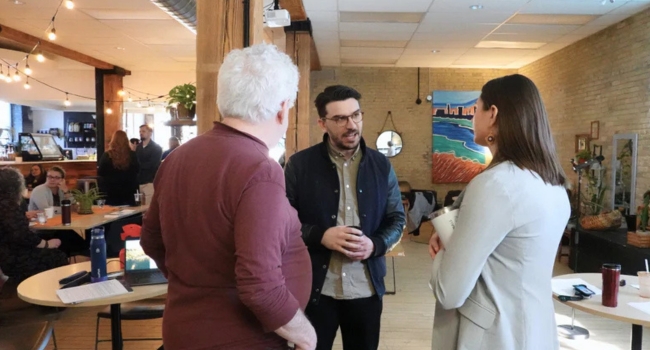 Atlohsa is now working with local partners to work toward implementing policy recommendation 1, which would be to allocate 30% of homelessness resources to Indigenous-led initiatives, modeled after Hamilton’s precedent, and to advocate for the federal government to re-open the Indigenous homelessness funding streams so London can become an Indigenous Community Entity. Next steps for this work include:
Atlohsa is now working with local partners to work toward implementing policy recommendation 1, which would be to allocate 30% of homelessness resources to Indigenous-led initiatives, modeled after Hamilton’s precedent, and to advocate for the federal government to re-open the Indigenous homelessness funding streams so London can become an Indigenous Community Entity. Next steps for this work include:
- Preparing a business case to support the implementation of all the policy recommendations outlined in our report.
- Working collaboratively with the City of London’s Housing Stability Services to bring this report and business plan to London’s city council for official approval and endorsement.
- Collaboration between theIndigenous Homelessness Leadership Circle and City of London towards allocating 30% of homelessness funding to Indigenous-led homeless-serving organizations.
Dedicating 30% of federal and provincial housing and homelessness funding to Indigenous-led housing and homelessness initiatives in London would contribute to the overall goal of reducing and preventing Indigenous homelessness. Notably, it would allow for Indigenous-led leadership in London’s Coordinated Access system to support cultivating a culturally safe housing continuum, and work towards Indigenous Community Entity status within the region as long-term goals.
Conclusion: A System Designed By, With, and For Indigenous Peoples
Atlohsa’s report outlines the need for Indigenous-led approaches to be implemented within the City of London’s Coordinated Access system to alleviate Indigenous homelessness. It offers a collective vision and roadmap of systems-level changes to better meet the needs of Indigenous people experiencing homelessness in our region over the next several years.
An Indigenous-led Coordinated Access system is not just possible in London; it is urgently needed and entirely achievable. The path forward is clear. Now it’s a matter of following it.
To learn more about at Atlohsa and the work we do: https://atlohsa.com
